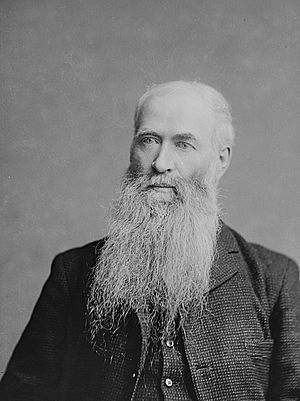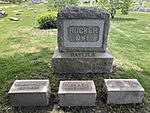William McEntyre Dye facts for kids
Quick facts for kids
William McEntyre Dye
|
|
|---|---|
 |
|
| Born | January 26, 1831 Washington, Pennsylvania |
| Died | November 13, 1899 (aged 68) Muskegon, Michigan |
| Buried | |
| Allegiance | United States of America Union Army Egyptian Army |
| Service/ |
Army |
| Years of service | 1853–1870 (U.S. Army) 1873–1878 (Egyptian Army) |
| Rank | Colonel (U.S.) Brevet Brigadier General (U.S.) Colonel (Egypt) |
| Commands held | 20th Iowa Volunteer Infantry Regiment |
| Battles/wars | American Civil War
|
| Other work | Chief of Washington, D.C. Police Department Military advisor to the Emperor of Korea Author |
William McEntyre Dye (born January 26, 1831 – died November 13, 1899) was an American soldier. He served in armies around the world. He became a general in the Union Army during the American Civil War. Later, he was a colonel in the Egyptian army. He also worked as a military advisor to the King of Korea.
Early Life and the Civil War
William McEntyre Dye was born in Washington, Pennsylvania in 1831. He went to West Point, a famous military school, in 1849. He finished his studies in 1853 and became a second lieutenant in the U.S. Army.
When the American Civil War started in 1861, Dye was a captain. He soon became a colonel, leading the 20th Iowa Infantry Regiment. In 1862, he led a group of soldiers called a brigade. His brigade fought in the Battle of Prairie Grove.
The next year, Colonel Dye and his regiment helped the Union army during the Siege of Vicksburg. This was a very important battle. After Vicksburg, Dye led different brigades. He fought in the Battle of Brownsville. He also helped attack Fort Morgan during the Battle of Mobile Bay.
Dye was given special honorary ranks for his brave service. He became an honorary colonel and later an honorary brigadier general. His last job in the volunteer army was helping to exchange prisoners of war.
Service in the Egyptian Army
After the Civil War, Dye left the U.S. Army in 1870. In 1873, he traveled to Egypt. The leader of Egypt, Ismail Pasha, wanted to make his army more modern. He hired several American Civil War veterans to help. Dye joined them as a colonel.
Another American general, Charles P. Stone, was already in the Egyptian army. Stone suggested Dye become a chief-of-staff for a campaign against Abyssinia. However, Dye did not agree with the Egyptian commander's plans. He became an assistant chief-of-staff instead.
Dye was hurt in his foot during the Battle of Gura. He later had a disagreement with another Egyptian officer. He returned to the United States in 1878.
After his time in Egypt, Dye wrote a book about his experiences. It was called Moslem Egypt and Christian Abyssinia. The book was published in 1880.
Working for the Korean Government
When Dye came back to the U.S., he worked as the Chief of Police in Washington, D.C. In 1888, a famous American general, Philip H. Sheridan, suggested Dye for a new job. Dye became the main military advisor to King Gojong of Korea.
He worked for the Korean king for 11 years. He even wrote a military guide in the Korean language. Dye returned to the United States in 1899. He passed away that same year in Muskegon, Michigan.
William McEntyre Dye was buried at Graceland Cemetery in Chicago.
 | Jewel Prestage |
 | Ella Baker |
 | Fannie Lou Hamer |


